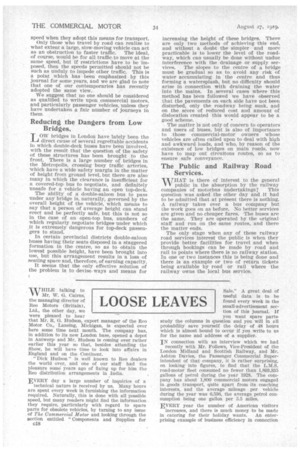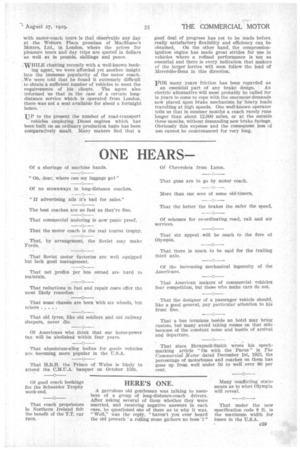LOOSE LEAVES
Page 40

Page 41

If you've noticed an error in this article please click here to report it so we can fix it.
WHILE talking to Mr. W. G. Cairns, the managing director of Reo Motors (Britain), Ltd., the other day, we were pleased to hear that Mr. R. G. Hudson, export manager of the Reo Motor Co., Lansing, Michigan, is expected over here some time next month. The company has, in addition to its new London base, opened a depot in Antwerp, and Mr. Hudson is coming over rather earlier this year so that, besides attending the Show, he will have time to look into affairs in England and on the Continent.
"Dick Hudson" is well known to Reo dealers the world over, and one of our staff had the pleasure some years ago of fixing up for him the Reo distribution arrangements in India.
EVERY day a large number of inquiries of a
technical nature is received by us. Many hours are spent every week in furnishing the information required. Naturally, this is done with all possible speed, but many readers might find the information they require, particularly with regard to spare parts for obsolete vehicles, by turning to any issue of The Commercial Motor and looking through the section entitled "Components and Supplies for
c18 Sale." A great deal of useful data is to he found every week in the small-advertisement section of this journal. If you want spare parts' study the columns in question and you will in all probability save yourself the delay of 48 hours which is almost bound to occur if you write to us for the name and address of a supplier.
IN connection with an interview which we had recently with Mr. Follows, Vice-President of the London Midland and Scottish Railway, and Mr. Ashton Davies, the Passenger Commercial Superintendent of that company, it is rather surprising, on looking into figures, to find that the L.M.S. road-motor fleet consumed no fewer than 1,893,335 gallons of petrol during the year 1928. The company has about 1,800 commercial motors engaged in goods transport, quite apart from its coaching interests, and the average mileage per vehicle during the year was 6,536, the average petrol consumption being one gallon per 5.5 miles.
EVERY year the number of American visitors increases, and there is much money to be made
in catering for their holiday wants. An enterprising example of business efficiency in connection with motor-coach tours is that observable any day at the Woburn Place premises of MacShane's Motors, Ltd., in London, where the prices for pleasure tours and day trips are quoted in dollars as well as in pounds, shillings and pence.
WHILE chatting recently with a well-known booking agent, we were afforded yet another insight into the immense popularity of the motor coach.j We were told that he found it extremely difficult . to obtain .a sufficient number of vehicles to meet the requirements of his clients. The agent also informed us that in the Case of a certain longdistance service which is operated from London, there was not a seat available for about a fortnight hence.
U P to the present the number of road-transport vehicles employing Diesel engines which has been built on an ordinary production basis has been comparatively small. Many makers find that a good deal of progress has yet to• be made before really satisfactory flexibility and efficiency can be obtained. On the other hand, the compressionignition engine has made great strides for use in vehicles where a refined performance is not so essential and there is every indication that makers of the larger lorries will soon follow the lead of Pdercedes-Benz in this direction.
FOR many years friction has been regarded as an essential part of any brake design. An electric alternative will most probably be called for in years to come to cope with the enormous demands now placed upon brake mechanism by heavy loads travelling at high speeds. One well-known operator tells us that in summer months a coach rarely runs longer than about 12,000 miles, or at the outside three months, without demanding new brake facings. Obviously this expense and the consequent loss of use cannot be countenanced for very long.












































































































